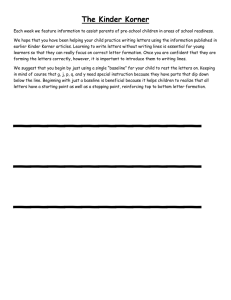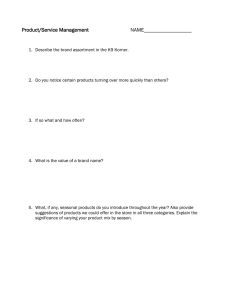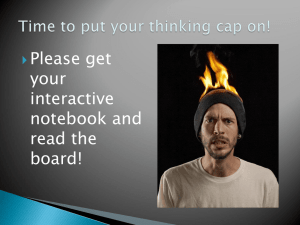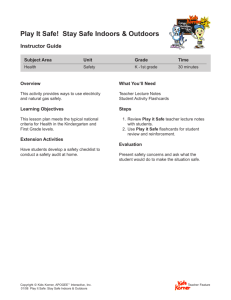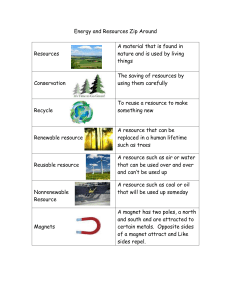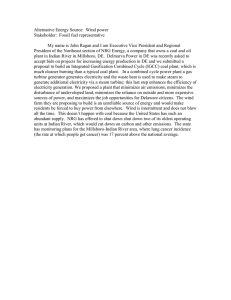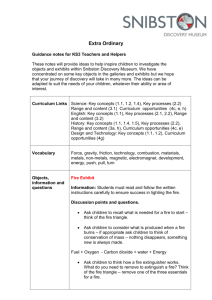What`s It All About? The Sun as a Power Source
advertisement
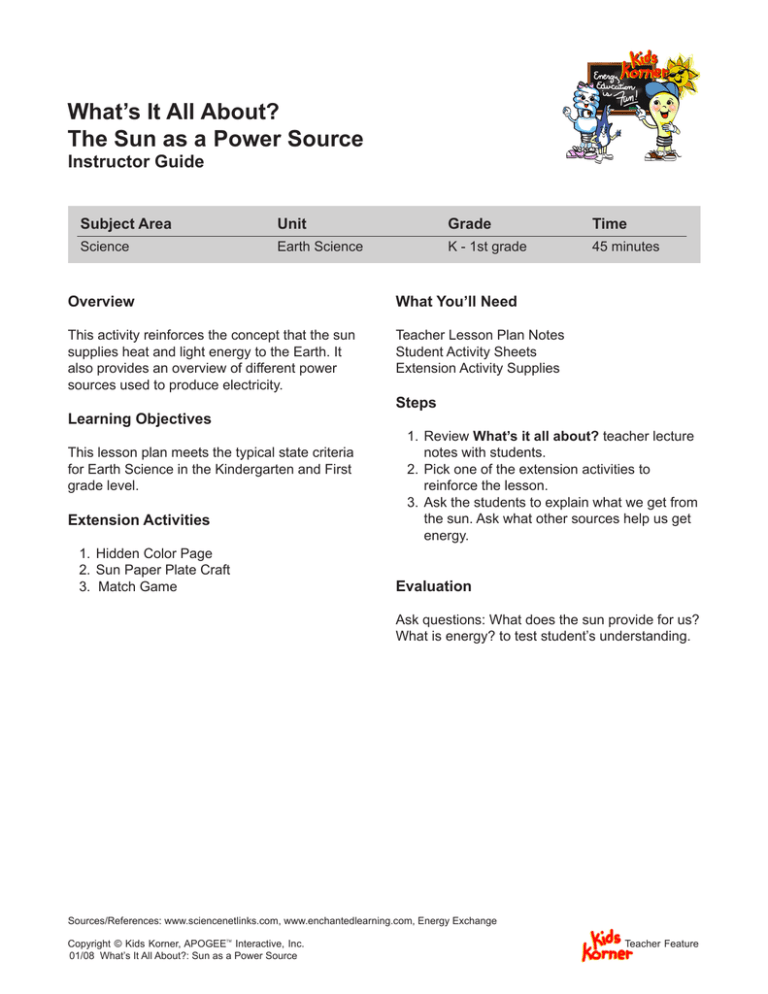
What’s It All About? The Sun as a Power Source Instructor Guide Subject Area Unit Grade Time Science Earth Science K - 1st grade 45 minutes Overview What You’ll Need This activity reinforces the concept that the sun supplies heat and light energy to the Earth. It also provides an overview of different power sources used to produce electricity. Teacher Lesson Plan Notes Student Activity Sheets Extension Activity Supplies Learning Objectives This lesson plan meets the typical state criteria for Earth Science in the Kindergarten and First grade level. Extension Activities 1. Hidden Color Page 2. Sun Paper Plate Craft 3. Match Game Steps 1. Review What’s it all about? teacher lecture notes with students. 2. Pick one of the extension activities to reinforce the lesson. 3. Ask the students to explain what we get from the sun. Ask what other sources help us get energy. Evaluation Ask questions: What does the sun provide for us? What is energy? to test student’s understanding. Sources/References: www.sciencenetlinks.com, www.enchantedlearning.com, Energy Exchange Copyright © Kids Korner, APOGEE Interactive, Inc. 01/08 What’s It All About?: Sun as a Power Source TM Teacher Feature Teacher Lecture Notes Energy is the power to do work. Energy makes everything go! What’s it all about? Why We Need Energy Energy is an essential part of our daily lives. We use energy to heat and cool our homes, schools and businesses. We use energy for lights and appliances. Energy makes our vehicles go, planes fly, boats sail, and machines run. All living things need energy too. Plants use the light from the sun to grow. Animals and people eat the plants and use the energy that was stored. Food is fuel for our bodies’ energy needs like muscle power. We also use our own bodies to make heat energy. When you have been running or working real hard, your body produces heat energy. When you wear clothing like a jacket in the winter, it holds in that heat energy and keeps you warm. A Brief History of Energy The very first energy source was the sun providing heat and light during the day. Later fire was discovered by a lightning strike, producing another source of heat and light. Thousands of years later we discovered that the wind could be harnessed and we began to use sails on our boats for transportation. Later we began to use windmills to turn water wheels for grinding grain Throughout history, we have made lots of discoveries using energy. Before 1850, wood was our main source of fuel for heating, cooking and producing steam for powering steam engines for the railroads. Natural gas was used as early as 500BC by the Chinese. They would find natural gas leaking from the ground and use bamboo to pipe the gas for use in boiling sea water to remove the salt. From about 1850 to 1945, coal was the main fuel source. Wood was still an important energy source for heating as well as natural gas for lighting, but water and wind were used less. For most of the 1900s, oil and natural gas were our main fuel sources. Electricity was used more in the late 1900s. From about 1945 to the present, nuclear and solar energy along with water and wind have played a larger role in the production of energy. Other alternative energy sources being used today are geothermal and biomass. Power Source Energy comes from a power source. For example, we get heat and light energy from the sun. The sun is an energy source. There are many types of power sources. Most energy comes from fossil fuels (coal, oil, gas) which were formed when ancient plants, and animals like the dinosaurs, died hundreds of millions of years ago. Copyright © Kids Korner, APOGEE Interactive, Inc. 01/08 What’s It All About?: Sun as a Power Source TM Teacher Feature Let’s take a look at the types of power sources that are used: Oil and Gas are pumped from wells deep in the ground and under the ocean. They are then sent through pipelines to be refined or cleaned. Wood and Coal is mined underground near the earth’s surface. Coal can also be converted to a liquid or gas form. Water Power (hydropower). As water flows downhill it is channeled to a turbine or water wheel. The force of the flowing water turns the turbine or wheel, which turns a generator to make the electricity. Sun Power (solar energy) gives us heat and light energy. Solar cells absorb the sunlight and special photovoltaic cells produce electricity that can be used directly or stored in batteries for later use. Nuclear Power is used to make electricity. Inside a reactor atoms from a fuel called uranium are split by neutrons (nuclear fission). This energy is released as heat which changes water into steam that turns turbine generators. Wind Power. Wind has been used for hundreds of years to help ships sail and turn windmills to pump water for irrigation. Copyright © Kids Korner, APOGEE Interactive, Inc. 01/08 What’s It All About?: Sun as a Power Source TM Teacher Feature Activities Page - The Earth’s Oldest Resource Color in the sections by matching the color to the letters. B = Blue Y - Yellow O = Orange Copyright © Kids Korner, APOGEE Interactive, Inc. 01/08 What’s It All About?: Sun as a Power Source TM R = Red Teacher Feature Extension Activities - Sun Paper Plate Craft Supplies needed: Paper plate Yellow and orange construction paper Scissors Glue Yellow crayons, paint or markers Googly eyes Instructions: 1. Paint the back side of a paper plate yellow. 2. While drying, trace a student’s hand on yellow and orange construction paper about 7 - 8 times. 3. Cut out the handprints. 4. Glue the handprints to the paper plate side that’s not painted. 5. Draw a mouth and nose on the yellow painted side. Glue on googly eyes. Copyright © Kids Korner, APOGEE Interactive, Inc. 01/08 What’s It All About?: Sun as a Power Source TM Teacher Feature Activities Page - Match Game Draw a line to match the power source with the correct pictures. Nuclear (Solar Power) Sun Wind Wood Oil Natural Gas (Hydro Power) Water Copyright © Kids Korner, APOGEE Interactive, Inc. 01/08 What’s It All About?: Sun as a Power Source TM Teacher Feature
